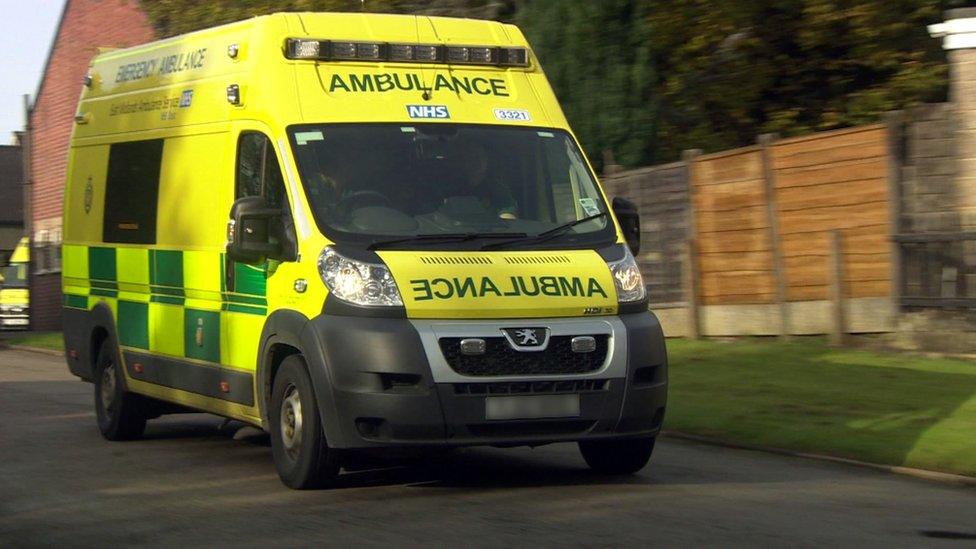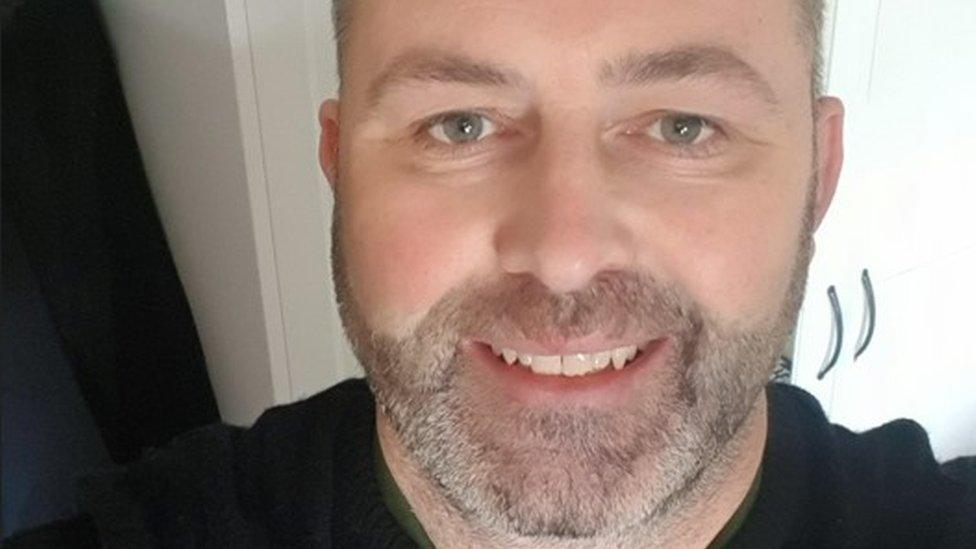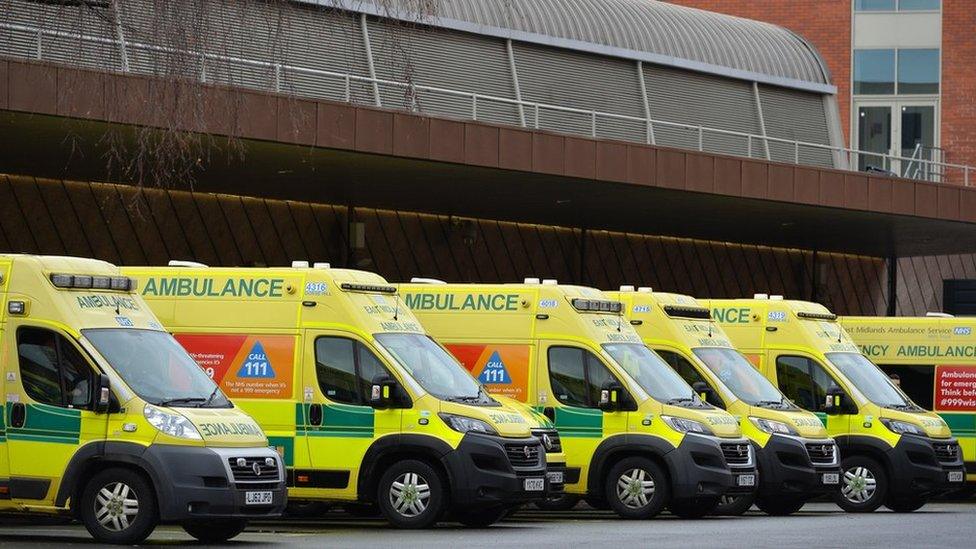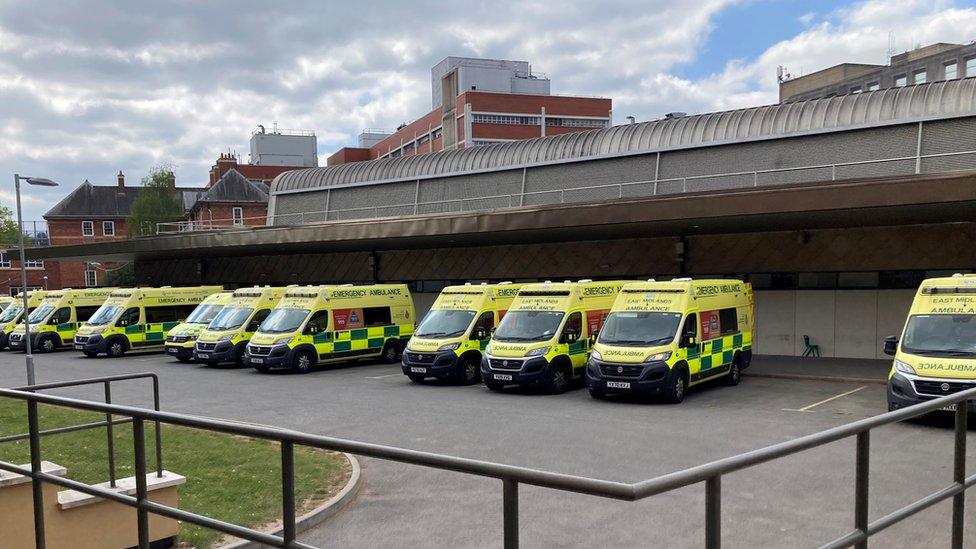Ambulance handover delays at hospitals cost £22m in one year
- Published

East Midlands Ambulance Service lost 166,659 hours in the 12 months to September, due to handover delays
Working hours lost to hospital handover delays have cost an ambulance trust more than £22m in the past year, it can be revealed.
East Midlands Ambulance Service (EMAS) lost 166,659 hours while ambulances waited to drop off patients at hospitals in the year up to September.
This meant an estimated £22,165,647 - based on one lost hour costing £133, according to EMAS - went to waste.
The cost has doubled compared with the previous 12-month period.
Handover delays totalling 84,421 hours were recorded in the year to September 2021 - costing EMAS an estimated £11,227,993.
EMAS said the delays - which are often caused by difficulties hospitals face in freeing up beds - were "negatively impacting" finances.
This therefore hinders its "ability to deliver an efficient service".
'Frustrating and frightening'
Hospital trusts in the region have been attempting to reduce delays by focusing on discharging medically-fit patients and improving patient flow from accident and emergency (A&E), but EMAS said they had had "limited success".
The Patient Association said the situation was "complex" and believed it would be "challenging to resolve until shortages in workforce across all parts of the NHS and social care are tackled".
Chief executive Rachel Power said: "The crisis the NHS has been in for many months now stretches from people waiting for an ambulance, right through the system to people stuck in hospital unable to be discharged for lack of social care to support them once they are home.
"If hospitals cannot discharge the medically fit from hospital, A&E departments can't transfer patients that need a hospital bed on to a ward, and paramedics cannot hand over patients waiting in ambulance to A&E staff.
"For patients, the situation is frustrating and frightening."

'We cannot respond'

Paramedic Gary Brownhill says the situation is not what he signed up to
Gary Brownhill, a Unison health and safety rep and paramedic who works out of Worksop station, said handover delays had grown worse since the start of the coronavirus pandemic.
"Hospitals are under massive pressure where they are not able to discharge patients from wards because there is no respite care, so they are bottlenecking up in A&E which means the patients we have, there's nowhere to put them," he said.
"So it means we've potentially got the patient on the back of the ambulance for anything between half an hour and four or five hours at times.
"It's serious, not only for those patients who are waiting for ambulances, but those on the back of the ambulances. We are very limited with what we've got to offer a patient that is deteriorating.
"It's not what we signed up to. We want to get to patients as quickly as we can to do the best we can, so being stuck in the back of an ambulance outside hospital and hearing over the channels there's a patient [elsewhere] in cardiac arrest or a serious road traffic collision, we are frustrated because we cannot respond.
"Some of these are a minute, two minutes from where we are. The nearest resources can be 25 to 30 minutes away. We just want to be out there, doing the best we can and unfortunately, currently we are not able to do that."

The highest number of hours lost over the past two years came in March this year, when the number of time lost exceeded 17,000 hours.
EMAS said there were particular delays in hospitals accepting patients that month.
The findings, which have been revealed by a freedom of information request to EMAS by the BBC, are equivalent to losing about 38 12-hour shifts per day.
The service operates across Nottinghamshire, Derbyshire, Leicestershire, Rutland, Lincolnshire and Northamptonshire.
Nichola Bramhall, EMAS director of quality improvement and patient safety, added: "It is not within the control of the ambulance sector alone to reduce hospital handover delays, and we continue to play our part to help address the issue.
"In addition to our patients, staff and resources, handover delays are also negatively impacting on our finances and therefore our ability to deliver an efficient service.
"Our primary focus remains on keeping patients safe and delivering the best possible clinical care."

Analysis
By Rob Sissons, BBC East Midlands Today health correspondent

The target is for patients arriving by ambulance to be officially handed over into the care of A&E staff within 15 minutes. Any delay beyond, this is a handover delay.
If there is not enough space or staff in the emergency department, the patient may be left waiting in the back of the ambulance outside the hospital.
The ambulance crew remain responsible for the care of the patient until there has been a clinical handover with hospital staff.
All the time the crew and patient are held up, there are likely to be more 999 calls coming into the service that are more difficult to respond to.
Handover delays are an indicator of the entire health and social care system under pressure.
If not enough medically-fit patients are discharged from hospital each day, then there can be a shortage of beds on the wards.
This in turn makes it difficult to transfer patients out of the emergency department who are judged to need a hospital stay on the wards.
Delays getting medically-fit patients out of hospital can be due to problems organising social care packages and placements in care homes.
But not all delays are down to other providers. Many hospitals recognise there is more they can do, for example patients are sometimes kept waiting for medication before they go home.

Follow BBC East Midlands on Facebook, external, on Twitter, external, or on Instagram, external. Send your story ideas to eastmidsnews@bbc.co.uk, external.
Related topics
- Published5 October 2022

- Published1 September 2022

- Published16 June 2022
